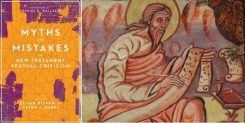So far we have examined four reasons people disbelieve in God. Now we will consider many different aspects of the Bible that sceptics find unbelievable:
- things too awful or silly for them to believe, or
- things that are inconsistent with science, history, or other parts of the Bible.
Are christians placing their faith in a book that is impossible to take seriously? Are there better ways both believers and unbelievers can understand the Bible?
It says what …??
Many people raised in christian families have stopped believing in God because of difficulties they have found in the Bible. It’s not hard to find websites devoted to pointing out these difficulties.
There seem to be five main areas where the Bible is criticised as unbelievable:
Evil and ugly
In the Old Testament, God commands murder, even genocide. Some of the laws he gave to his people seem racist, patriarchal and harsh by our standards today. Crimes such as child sacrifice, cursing God and illicit sex were punishable by the brutal death by stoning.
Just plain silly
Former christian Dan Barker says the Bible is “a book that has talking animals, wizards, witches, demons, sticks turning into snakes, food falling from the sky, and people walking on water — and you say we’re the ones that need help?”
Inconsistencies
Some teachings disagree with others. The major differences are between the Old and New Testaments. For example, “an eye for an eye” in the Old Testament becomes “turn the other cheek” in the New. The Ten Commandments require parents to be honoured, whereas Jesus says they must come second to him. And there are different and inconsistent accounts of some events such as the resurrection of Jesus.
The Bible contradicts science and history
The creation account isn’t consistent with evolution, the story of the sun standing still is impossible, and dead men don’t come back to life. The accounts of the Exodus from Egypt and the conquering of Canaan don’t seem to fit known history and archaeology.
Bronze age goat-herders?
Some of the stories and ethics are quite understandable and acceptable in the culture of the time. But it is hard to see how they can be seen as timeless truths for the twenty-first century. For example, laws on clean and unclean animals and foods, and the treatment of mould in houses.
So how can a christian believe all that?
Some christians try to justify everything in the Bible as being totally true and from God, and others who seem to simply ignore the problems.
I can’t see how either response can stand. Ignorance is not a path to truth. Even those who claim everything written is true have to find ways to avoid some of the teachings.
The scientific and historical facts don’t allow me to believe everything in the Old Testament is literally true. And I cannot believe that murder and genocide on the scale depicted in the Old Testament can ever be justified – and Jesus agrees with this!
So we need to address these issues with integrity.
Understanding the Old Testament
Most of the problems come from the early Old Testament, so I will begin there.
Three facts lead me to think that both the attacking atheists and the defending christians have misunderstood the Bible.
So much looks legendary
If we read many of the early Old Testament stories in any other context, we would regard them as myths. We would think that quite possibly they were based on historical events and characters, but they contain much that is mythical. That they were written to explain that culture’s place in the world, not to record literal history.
You can think of the stories of Gilgamesh, Enuma Elish and Atrahasis from a slightly earlier time than the Bible, and from nearby lands. No-one would think otherwise than that these are mythical stories not literal history. You could say the same about ancient stories from around the world.
So it is reasonable to accept the possibility, even the likelihood, that the early Old Testament is what it seems to be also.
Science, history and archaeology
Science has shown that evolution is generally true. Therefore the creation account in Genesis is not a literally true account (see Evolution and God).
But the history is a more complex question.
Much of the early Old Testament cannot be verified or dismissed as history because there is no real evidence either way. Some parts of the stories ring true to the culture at the time, others contain anachronisms, but neither of these is really decisive.
The real test comes when we get to accounts that can be checked against known history. The best example is the “conquest” of Canaan by the Israelites under Joshua. Briefly, the book of Joshua contains two stories, one of total conquest and one of gradual assimilation with occasional warfare. The archaeology and other evidence supports the second story much better than the first. It seems that the first story is idealised, written to justify the Israelites’ claim to the land, whereas the second is much more historical.
So both history and science support the conclusion that the early Old Testament should not be considered “historical”, but rather a mix of history and legend.
But the really interesting thing is that the Jewish scribes or priests who put the Jewish scriptures together left both stories in. They didn’t seem to be trying to make their scriptures consistent or totally historical.
Jesus and the apostles
Even more interesting is to examine how Jesus and the early christians understood their scriptures. While there is no doubt that they reverenced them, the evidence shows that they didn’t always interpret their scriptures literally. In many cases they re-interpreted them, changed their meaning, or quoted selectively from them (see Reconstructing how we see the Bible).
In this they were carrying on the tradition of the old Israelite prophets, who often reinterpreted the ancient laws and commands found in the first five books of the Bible.
So this again reinforces the view that the Jewish scriptures, especially the earlier, older sections, were not written as literal history. They were not considered inviolate and weren’t always taken literally by those who believed in them.
Not only …. but also ….
In deconstructing the Old Testament in this way, we shouldn’t forget its many positives:
- Much in the later accounts (from king David onwards) is more or less historical, and some is confirmed by other historical accounts.
- While the health and dietary laws can seem quaint to us, many of them were very advanced for the time and effective in creating a more healthy people.
- Likewise some of the justice laws were advanced for their time. Care for the stranger was unusual, and laws on refuge cities and “an eye for an eye” were a big deterrent to vengeance to preserve honour.
- Although God is portrayed as being angry on many occasions, he is portrayed as loving and merciful far more.
So we see that the Old Testament often preserves more than one story, and more than one way of looking at an ethical, social or religious issue. And gradually a new way unfolds.
We can see in the Bible and in the archaeology the Israelites moving from belief in Yahweh as a more or less tribal god, supreme among all the gods (monolatry), to monotheism. We can see the prophets correcting the earlier more barbaric conceptions of God, ethics and justice to something much “higher” and more worthy.
This is the Old Testament we actually have.
Reading the Old Testament as it actually is
So if we read the Old Testament as it actually is, and in the cultural context of its time, we can say quite surely that many parts of it shouldn’t be taken as literal history nor literal commands by God.
And certainly not as the actual inerrant words of God.
It reads more like an unfolding story and, if you accept it, as an unfolding revelation, where the later often supersedes the earlier.
Undermining the arguments
If this is all true, most of the arguments are no longer based on fact, but on expectations.
Conservative christians believe that the Bible came from God and so must be perfect. To modern people, that generally means literal and historical, and never mythical or inconsistent. Atheist critics often expect the same.
But the Old Testament actually seems to be a story that begins in myth and legend and gradually becomes more historical (as CS Lewis said more than half a century ago). Understood this way, so many apparent problems dissolve:
- The creation story is an ancient legend that replaces a polytheistic creation with a monotheist one.
- The killing commands were the tribal beliefs of a barbaric culture, gradually amended through the revelation of that montheistic God.
- Some of the strange stories are folk tales that convey something of how the Israelites saw their place in the world.
- The quaint and obsolete commands are an early attempts at creating a law code, later corrected.
- So many of the apparent inconsistencies are actually the slow growth in revelation and understanding, until the truth was revealed in Jesus.
Could God not have revealed himself this way?
Like I said, I think a lot of difficulties are based on expectation. We so easily expect that scriptures come directly from God. And if they do, then they must be perfect.
But instead we should start at the opposite end of that logic chain. Start with the known facts, and draw conclusions from them.
This is what the Old Testament is like. Is there any reason to suppose that God couldn’t have revealed himself and truth that way?
Conservative christians don’t like that thought because it seems to diminish the scriptures and so diminish God. And atheists critics tend not to like it much either because it takes away their easy target.
But if we base our conclusions on what expert historians, archaeologists and anthropologists have concluded, then that is the reality of the scriptures. And that is the explanation for most of the otherwise embarrassing facts that the critics point to.
And I can’t think of any reason why God couldn’t have chosen that way to reveal himself.
But what about the New Testament?
The problems with the New Testament are not nearly so difficult. The most important seem to be some apparent inconsistencies in some of the gospel stories (notably the resurrection stories), the miracles of Jesus, and the concept of atonement which many find unbelievable.
The historical anomalies can be explained easily. Some will simply be an outcome of our ignorance of many of the facts behind the stories. Others will have occurred because the stories of Jesus were mostly passed down orally before they were written down. This has been shown to be a process that preserves the central story quite accurately but allows creative and sometimes inaccurate transmission of some of the peripheral elements. Exactly as we find in the gospels.
Of course it isn’t always easy to determine exactly what happened or was said when we have differing accounts, but none of the differences have a major impact on christian belief (see New Testament errors?).
The miracles are a difficulty for an atheist, because miracles can’t happen if there’s no God. But if there’s a God, then miracles are easily explained. The miracles are consistent with the story being told. Either both are true, or neither.
The atonement remains a mystery. It can be satirised as cosmic child abuse, but it’s always possible to mock something serious, especially if it is somewhat of a mystery. The doctrine can be presented in a different way as something heroic – it all depends on one’s viewpoint. If this is the largest problem in the Bible, then there is little to defend.
So I don’t believe the problems of the New Testament are major, compared to the Old Testament difficulties, and I have addressed all of them in more detail – see the references below.
But wait! Doesn’t this mean we can’t be sure of any of it?
Not at all. We believe each part of the Bible to be what it actually is. We live in a time when information is readily available to anyone reading this. So we can all check what the experts say and so develop our understanding of what is true.
So some parts are historical, and we accept them as such. Most importantly, this includes the gospels, but also includes much of the later Old Testament.
If we decide we believe in Jesus, we can believe his teachings and those of the New Testament generally.
This website contains much that can assist in this assessment.
Conclusion
These charges against the credibility of the Bible actually turn out to be the path to a much better understanding of the Bible, especially the Old Testament. Christians and unbelievers alike can build their understanding on what the experts tell us. Discussion on the truth or otherwise of the christian faith can go on from there.
So these are not, in themselves, reasons to disbelieve in God.
They may be a reason to challenge and disbelieve in a “fundamentalist” understanding of christianity, but they barely touch on belief based on the best scholarship.
So they are certainly reasons to reconsider our faith …. and our disbelief.
Read more
- What the scholars tell us about the Old Testament. A summary.
- Difficulties with the Old Testament. 3 pages based on the middle view between the christian apologists and the arch sceptics.
- What the scholars tell us about the New Testament. Another summary.
- The New Testament as history. 7 pages outlining the conclusions of scholars.
- The archaeology of the Old Testament.
Next page
If there’s a God, why doesn’t he answer our prayers?
Graphic: Free Bible Images.







